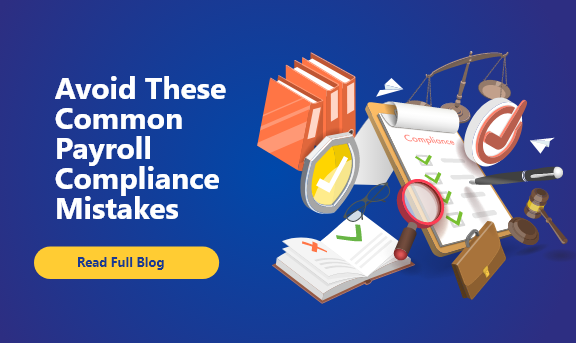Quick links
- Classifying Independent Contractors
- Failing to Account for Vacation Time
- Failing to Track Sick Leave Time
- Failing to Calculate Overtime Pay
- Offering Disability Benefits without Reporting Them on W2s
- Missing important deadlines
- State-wise payroll and tax calculation
- Automate your payroll to avoid mistakes
Working with payroll compliance can seem like a daunting prospect if you’ve never done it before.
Luckily, plenty of other business owners have done this, and you can benefit through the wisdom they gleaned from their successes and their mistakes. This guide on how to stay compliant with your payroll will help you with everything from employee tax withholdings to overtime pay to payroll tax payments.
Following these simple tips will help keep you out of trouble with the law and ensure that your employees get paid properly each month.
1. Classifying Independent Contractors
A common payroll compliance mistake is while classifying employees as independent contractors instead of W-2 employees. If you choose to hire workers as ICs instead of W-2 employees, it can open your business up to a host of problems like nonpayment of taxes, underpayment of wages and overtime pay, discrimination issues, sexual harassment suits, and much more.
2. Failing to Account for Vacation Time
Vacation is a tricky thing to account for when processing payroll. Vacation time, sick time, jury duty—these can all factor into an employee’s pay. If you don’t take these considerations into account, you could end up paying your employees more than you’re supposed to or not paying them enough.
What exactly are they supposed to’s? That depends on what kind of business you run and what kind of employment contracts (if any) you have with your employees.
3. Failing to Track Sick Leave Time
According to payroll laws, if an employee is sick for less than a full day, you are not required to pay them. This means that your company’s policies must accurately track their hours; otherwise, you might have to pay employees for time they weren’t actually at work—and risk falling out of compliance with state and federal payroll laws. Compensate hourly workers based on hours worked, which can include overtime or not-to-exceed pay amounts.
4. Failing to Calculate Overtime Pay
While only salaried employees who work more than 40 hours per week are entitled to overtime pay, it’s important that you check to see if your state requires you to pay employees a set wage for certain periods.
For example, in California, employees must be paid time-and-one-half for all hours worked over eight in a day. If you fail to calculate and remit overtime properly, not only can you face steep fines, but also potentially lose your employees’ trust.
5. Offering Disability Benefits without Reporting Them on W2s
Employers who offer disability benefits as part of their total compensation package may wonder whether they have to report these payments to their employees on Form W-2. The short answer is no unless they meet one of three criteria for reporting them.
The information below will help you determine if your disability benefit payments should be reported on your employee’s W-2 or elsewhere on your tax return. It also covers how you and your employee can report them correctly.
6. Missing important deadlines
Missing important deadlines, such as filing employee timesheets or paying payroll taxes can lead to steep fines and possible criminal charges. Make sure you review each state’s reporting requirements.
For example, some states require monthly reports on employment taxes while others only require reports twice a year.
Be sure to check with your state tax agency so you don’t miss any required reporting deadlines.
7. State-wise payroll and tax calculation
When it comes to payroll taxes, there are several state-based regulations that must be complied with. An easy way to avoid payroll compliance mistakes is to know what those regulations are and where they apply. If you are operating in more than one state you need to ensure you abide by the specific state’s payroll laws and compliance.
Automate your payroll to avoid mistakes
If you have employees, it’s important to understand your payroll laws and to implement a system for tracking their hours and compensation. One of the best ways to avoid making costly payroll compliance mistakes is to automate your payroll processing.
While it’s true that no news is good news, it’s not necessarily a good thing when you hear absolutely nothing from your payroll provider. In fact, if you don’t stay on top of your payroll and ensure compliance with federal and state laws and regulations related to compensation issues, you could face severe penalties or fines.
To help minimize your risks related to payroll compliance mistakes, consider automating your payroll to lower costs and maintain efficiency while minimizing these errors.
Get in touch with one of our payroll experts to set up a demo and start your 30-day free trial.















